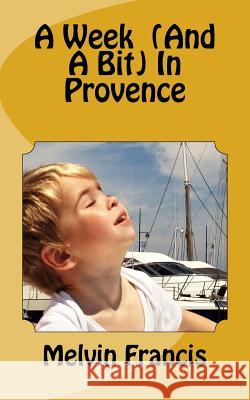A Week (and a bit) in Provence » książka
A Week (and a bit) in Provence
ISBN-13: 9781517327033 / Angielski / Miękka / 2015 / 364 str.
They say that life flashes before your eyes when you're about to die. It's a common saying, which has found its way into our lexicon as an indicator of grave danger. And, do you know, it makes a lot of sense. It's one of those untenable truths that we all understand. In the few times you may have been in danger, things kind of slow down; somehow your mind processes life quickly, clearly, and it reaffirms indelible memories in your mind. Whether this is down to some function of psychology or otherworldly phenomena, who knows? Mortality can be a powerful motivator and muse. Author Melvin Francis' autobiographical tale, A Week (And A Bit) In Provence, captures this idea of life flashing before one's eyes, but in a unique and endearing way. Adjured to write his memoirs after a procedure to unblock arteries in the heart, the work stands as a tribute to Francis' friend John, who died of the same condition a few years prior. The author could have made the surgery a coda for his presentation. However, he chose to place it front and centre. His duration in hospital is the very instrument of reflection - it's a metaphorical and real flashing of life before the reader's eyes. In the prologue, an alarmed Francis is in the hospital. It's shortly after Christmas, and he is watching his angioplasty on a pair of monitors above his head. The beginning of the 'Week-And-A-Bit' is on Boxing Day when he is rushed to the hospital and told he has heart disease. Mr. Francis digresses by telling us a little about himself. Primarily, we understand how he and his wife (both known as 'She' and 'Me' throughout the work) have come to live in Vidauban, France. We read of life in Provence; it's fun to see Francis, an Englishman, relating tales of French life. We learn of their new neighbours and friends back home, about wild mushrooms and tales of skiing. With a keen knack for making things flow, the author drives us through little vignettes of personal history in a narrative fashion. One thing makes him think of something else, which is the genesis for the next story. In between these chains-of-thought we are pulled into the sterile environment of the hospital in France. Francis examines the experience with a dry wit and humour, before, once again, being reminded of a new story to tell. We hear about the young man's first job at the gas board. Simple little nods to antiquated machinery and officious bosses. We read of the observations of irritating neighbours; the game of one-upmanship with Ray will have you laughing out loud. It is in these little moments, within the greater themes of location, occupation, and people, that A Week (And A Bit) In Provence really shines. These are the times when the author applies his experience and insight to life. These moments are quirky, funny, an example being their family-member by-marriage, Ed. The author laments his character as much as his fashion sense, branding him with the soubriquet, Dick Ed When we do get to the hospital and procedures, they are described comprehensively, but with a tongue-in-cheek quality. As with much of the work, he uses French phrases and dialogue. It is entertaining to see some serious moments between him and his doctor in French. Not only do they manage to infuse the French... attitude, they also lend a comical aspect. Many of the exchanges make sense, and fit perfectly in the scheme of how we would imagine an Englishman abroad to react. Despite the serious context in which the work is presented, the author's humour and attitude seem to get him through. This capability is clearly garnered from a life's worth or experience. A Week (And A Bit) In Provence is extremely funny, charming and poignant. It is not a dry recount of someone who thinks history owes them an ear. Ultimately, this is homage to a dear friend, and epistle to a beloved wife, wrapped up in an interesting collection of extraordinarily humorous tales.
Zawartość książki może nie spełniać oczekiwań – reklamacje nie obejmują treści, która mogła nie być redakcyjnie ani merytorycznie opracowana.











